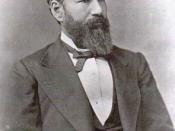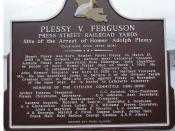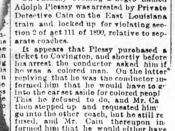During the 1890's the Supreme Court dealt with three important cases that were not fair and really violated human rights. These three cases were the United States vs. E.C. Knight of 1895, Pollock vs. Farmer Loan's & Trust of 1895 and also Plessy Vs. Ferguson of 1896. The results of these cases were very unjust for a few reasons.
The first court case that was unfair was U.S. vs E.C. Knight. The E.C. Knight Company with four other companies made a deal with the American Sugar Refining Company(ASRC). ASRC would purchase stocks and properties of these corporations and issue ASRC stocks. "The government said that this transaction violated the Sherman Anti-Trust Act because it intended to control sugar prices with a monopoly of the manufacture and sale of refined sugar." The issue of this case was, assuming the existence of a monopoly in manufacture, can the monopoly be directly suppressed under the act of Congress? The Supreme court decided that the suppression of the monopoly would be unconstitutional.(Pub
pg 54)
This case is unjust for two reasons. First off this case said it was okay to have a monopoly and control prices. This is unfair to all the competing businesses don't have a chance and odds are they will end up going out of business. The second reason why this decision was unfair was because what the E.C. Knight was trying to do was in violation of the Sherman Anti-Trust Act. Even though E.C. Knight seemed wrong they somehow managed to win the case and get there way.
The next case of the 1890's that was unfair was Pollock vs. Farmer Loan's & Trust. This was a case filed by Charles Pollock, for himself and all other stockholders of the Farmers' Loan & Trust Company. Specifically regarding taxes paid...


